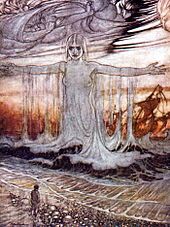The Depths of the Sea Goddess
Thalassa’s role in the Greek pantheon and her appearance in it is somewhat complex. This is primarily because of the lack of information on her. We know she is a primordial sea goddess, and that she was usually coupled with Pontus the ancient sea, but her origins and birth are shrouded in mystery. Thalassa is a captivating deity embodying the boundless expanse of the sea.
Origins and Attributes:
Thalassa, often referred to as the primordial goddess of the sea, holds a unique place in Greek mythology. Unlike some of the more well-known Olympian deities, Thalassa is considered a pre-Olympian goddess, embodying the ancient, unbridled force of the sea itself. She is perhaps a remnant of a preference civilization and as the mythology was being weaved she came in to be known as a primordial with no identifying parentage.
While other gods such as Gaia, Erebus, Eros, Tartarus, and Nyx are considered the five children of Chaos, Thalassa simply came to being to become the consort of Pontus, a child of Gaia. She has no origin and this adds to her power, for we do not and will never know the sea or ocean to its fullest.
Her name, derived from the Greek word for “sea” (thalassa), reflects her essence. Thalassa is sometime seen as the mother of Briares a Hecatoncherrie, while in other stories she is equal to a Gaia being her sister a forerunner to Tethys, the titan who will replace her. While she doesn’t appear as frequently in mythological narratives as some other gods and goddesses, her presence is felt in the rhythmic ebb and flow of the tides.
Thalassophobia refers to the deep and uncontrollable fear of the deepest depths of the ocean.

Thalassa in Mythology:
Though Thalassa’s mythology is not as extensively detailed as some of her divine counterparts, she plays a vital role in certain narratives. According to some interpretations, Thalassa is regarded as the mother of all sea creatures, symbolizing the fertility and life-giving qualities associated with the waters.
Thalassa’s importance is further underscored in the concept of primordial deities, representing the elemental forces that predate the more anthropomorphic gods and goddesses of the Titans or Mount Olympus. In this context, Thalassa embodies the timeless and unyielding power of the sea, an entity that predates the structured order of the divine hierarchy.
Symbolism and Reverence:
The sea, with its vastness, mystery, and unpredictable nature, has always held a special place in human consciousness. Thalassa, as the personification of the sea itself, symbolizes both its nurturing and destructive aspects. Mariners and coastal communities would invoke her name for safe voyages, bountiful catches, and protection against the perils of the open waters.
Thalassa in Art and Culture:
While Thalassa might not have a multitude of tales dedicated to her in ancient texts, her influence can be observed in various works of art and literature. From ancient pottery depicting sea scenes to later Renaissance paintings capturing the spirit of the ocean, artists have sought to capture the essence of Thalassa in their creations.
Conclusion:
Thalassa, the primordial ancient Greek sea goddess, stands as a testament to the reverence and awe. While her mythological narrative may not be as extensive as some other deities, her symbolic presence endures in the crashing waves, the rhythmic tides, and the eternal ebb and flow of the ocean—a living testament to the enduring power of ancient myths.